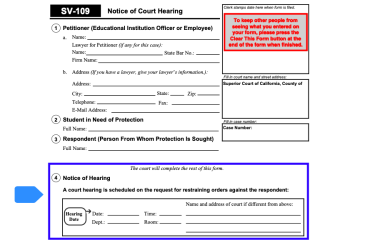What do these papers mean?
School Violence Restraining Orders (SV-109, SV-100, SV-110)
If you received any of these forms, someone asked for a restraining order against you:
- Notice of Court Hearing (form SV-109)
- Petition for Postsecondary School Violence Restraining Orders (form SV-100)
- Temporary Restraining Order (form SV-110)
A restraining order would limit your contact with the student protected by the order. And it could also impact your life in other ways, including preventing you from having guns and ammunition.
You have a court date where a judge will decide if they will grant the restraining order, which can last up to 3 years.
🔗 All links to court forms open in a new tab so you don’t lose your place.

When do I go to court?
Notice of Court Hearing (form SV-109)
This form tells you when you need to go to court.
- You have a court hearing (court date) because the school official listed in item 1 has asked for a restraining order against you.
- If you do not agree to having a restraining order against you, you must go to court on your hearing date and tell the judge why you do not agree.
📅 Look at item 4 on this form to see the date, time, and location for your court hearing.
What is the other side asking for?
Petition for Postsecondary School Violence Restraining Orders (form SV-100)
- On this form, the other side checked every order they want the judge to make (items 9-17).
- If you disagree with any of the orders, you must go to your court date and tell the judge why you do not agree.
- You may also tell the court in writing before the hearing date by filing a response.
Has the judge made any temporary orders against me?
Temporary Restraining Order (form SV-110)
This form tells you the temporary orders the judge made against you.
- Look through it carefully and follow all the orders.
- If you violate any of the orders you could be arrested, sent to jail, charged with a crime, or fined.
- If you own any firearms, firearm parts, ammunition, or body armor, see "Do I need to complete any papers?" right below for what you need to do to comply with the judge's orders.
⚠️ If you violate any of the orders you could be arrested, go to jail or be charged with a crime.
Do I need to complete any papers?
Turn in, sell or store your firearms, firearm parts, or ammunition.
If there's a Temporary Restraining Order against you (see form SV-110), you must file a receipt with the court showing that you turned in, sold, or stored your firearms (guns), firearm parts, or ammunition.
⚠️ You are also not allowed to have body armor while you have a restraining order against you. If you have body armor, you must relinquish it.
Learn how to comply with these firearm orders.
Tell the judge your side of the story, in writing.
While you wait for your court date, you also have the option of agreeing to the orders requested or explaining why you disagree with them.
💬 If you need help, you can go to your local self-help center.
Responding to a request for a restraining order
What's Next?
-
Obey gun orders
Learn how to comply with order to get rid of your firearms, firearm parts, ammunition, and body armor.
-
Respond in writing (optional)
Get step-by-step instructions for how to respond in writing, explaining what you want to happen in the case and why.
-
Prepare for your court date
Learn how to prepare for your restraining order court date.

